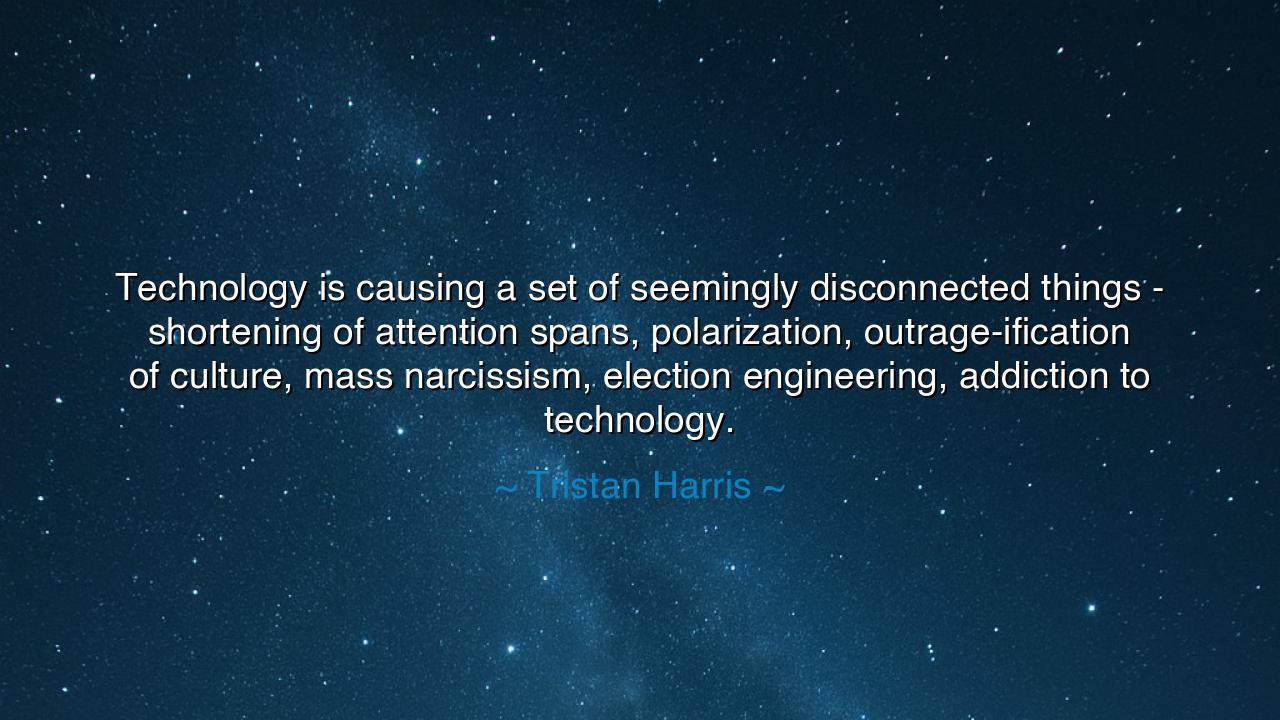
Technology is causing a set of seemingly disconnected things -
Technology is causing a set of seemingly disconnected things - shortening of attention spans, polarization, outrage-ification of culture, mass narcissism, election engineering, addiction to technology.






Tristan Harris, the modern philosopher of technology’s shadow, once spoke with a voice both urgent and mournful: “Technology is causing a set of seemingly disconnected things—shortening of attention spans, polarization, outrage-ification of culture, mass narcissism, election engineering, addiction to technology.” In these words he reveals not a single wound, but a constellation of wounds, each born from the same root. What seems fragmented—our scattered focus, our cultural fury, our vanity, our manipulation—are in truth strands of one web, spun by the devices we hold in our hands and the systems that shape them.
When Harris names the shortening of attention spans, he speaks to the quiet theft of one of humanity’s most precious treasures: the ability to dwell, to think deeply, to gaze long upon a problem, a story, a soul. Once, patience and contemplation were honored virtues, the soil from which wisdom grew. But now, in the whirlwind of flashing images and endless feeds, the mind is trained to skip like a stone across the surface of water, never sinking deep. This is not merely inconvenience—it is a diminishment of human capacity itself.
He speaks too of polarization and outrage, the sharpening of divisions, the boiling of emotions. Technology’s architects, seeking profit, discovered that anger spreads faster than peace, conflict faster than harmony. Algorithms, like hidden generals, marshal armies of outrage and send them crashing against one another. What was once debate has become warfare; what was once disagreement has become enmity. Harris unmasks this design, showing us that the tools built to connect us often enslave us to fury.
Consider the great experiment of the 2016 U.S. election, when the world saw how social media could be weaponized. Misinformation spread like fire, outrage was fanned like flame, and the very machinery of democracy trembled. What once was a tool for dialogue became a battlefield where truth itself was contested. Here the warnings of Harris found flesh: technology did not simply reflect society—it engineered its divisions, it bent the course of nations.
And he names also mass narcissism and addiction, the new idols of our time. Where once men sought glory in battle or wisdom in study, now many seek it in likes, in follows, in fleeting applause of digital crowds. The self becomes a brand, the image becomes more cherished than the reality, and countless souls find themselves chained to the glow of the screen, unable to turn away. Addiction, long a scourge of substances, has now entered the realm of attention, of time, of thought itself.
Yet Harris does not speak to condemn technology absolutely. Like fire, it can warm or consume. Like the plow, it can feed or wound. His words remind us that the tools themselves are not destiny—it is our use of them, our design of them, our governance of them that determines whether they uplift or destroy. The dangers he names are not inevitable; they are warnings, urging us to awake before the tide sweeps us away.
The lesson for us is clear: we must reclaim our humanity from the machines we have built. Let us guard our attention as sacred, resisting the lure of endless distraction. Let us meet polarization with dialogue, refusing to become pawns of outrage. Let us use technology as a servant, not a master—choosing when and how to engage, rather than being dragged by invisible currents. Above all, let us remember that truth, compassion, and justice are not coded into algorithms—they must be chosen and defended by us.
So let Tristan Harris’s words echo like a trumpet through the generations: “Technology is causing these things.” But also: humanity can correct them. Let us be vigilant, let us be wise, let us not bow before the glowing idols of our age. For if we guard our values, and shape our tools with conscience, then the same technology that now divides us may yet become the bridge to a nobler future.






AAdministratorAdministrator
Welcome, honored guests. Please leave a comment, we will respond soon